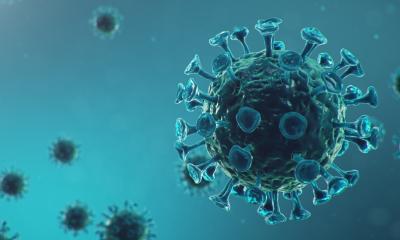Image source: Adobe Stock/taidundua
News • Preventing EBV reactivation
Liver transplantation: Finding the "sweet spot" of immuno-suppression
Since 2003, physicians at the Leiden University Medical Center (LUMC) have been screening all adult patients who receive a donor liver for Pfeiffer virus particles in their blood. Is the test positive? Then they reduce the dose of immunosuppressive drugs so that the patient's own immune system can tackle the virus.
As a result, fewer patients developed a malignant lymphoma after transplantation, which is usually associated with this virus. The doctors report this in Annals of Internal Medicine.

Image source: LUMC
About 98% of all adults have been infected with the virus that causes Pfeiffer's disease, or Epstein-Barr virus (EBV). The virus remains in the body but is kept contained by the immune system. After a transplant, patients are given drugs that suppress their immune system to prevent organ rejection. However, this can also wake up the dormant EBV, which could lead to white blood cells dividing uncontrollably. That is when so-called post-transplant lymphoproliferative disease (PTLD), a rare but serious form of cancer, develops. By screening all patients for EBV particles in the blood after liver transplantation at the LUMC since 2003, and lowering immunosuppression after two positive results, doctors saw far fewer cases of PTLD.
"In this way, the immune system is able to eliminate EBV itself," says Professor of Gastroenterology and Hepatology Bart van Hoek. In the period from 2003 to 2017, PTLD was diagnosed only once at the LUMC. In the historical control groups in Leiden and Rotterdam and among patients in Rotterdam during the same period, where there was no EBV monitoring, doctors saw 28 PTLD cases. Even after adjusting for confounding factors, there is a strong indication that this simple strategy can prevent the majority of PTLD. Over 70% of PTLD cases are due to EBV, so the remaining cases may not be prevented with this tactic.
[These results] highlight once again that not every patient needs the same amount of immunosuppression
Bart van Hoek
Each patient was regularly tested for EBV in the first year after transplantation, thereafter less frequently. "We would take some blood and do a PCR test," Van Hoek says. After two positive tests within two months, and sometimes after one positive test, immune suppression was reduced. "We saw slightly more rejection symptoms in this group, but were able to treat it well. Overall, we can conclude that reducing immunosuppression this way is safe."
According to Van Hoek, these results also show that an EBV-positive test is a good indicator of too much immune suppression. "And it highlights once again that not every patient needs the same amount of immunosuppression." This won't be the case in liver transplants alone, Van Hoek expects. "In fact, we also see PTLD after other organ or stem cell transplants." The Department of Renal Diseases, for example, has already expressed interest in investigating such monitoring, and Van Hoek thinks other departments and hospitals will follow. Within the LUMC, EBV monitoring is already standard care after liver transplants. "After all, it is a simple strategy that can save lives and prevent a lot of disease burden," Van Hoek concludes.
Source: Leiden University Medical Center
17.01.2023











